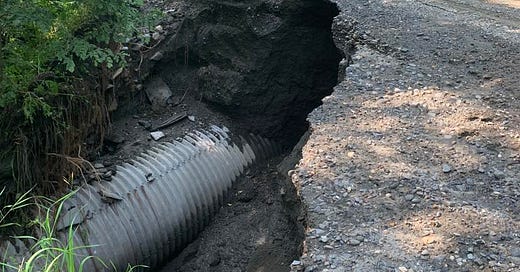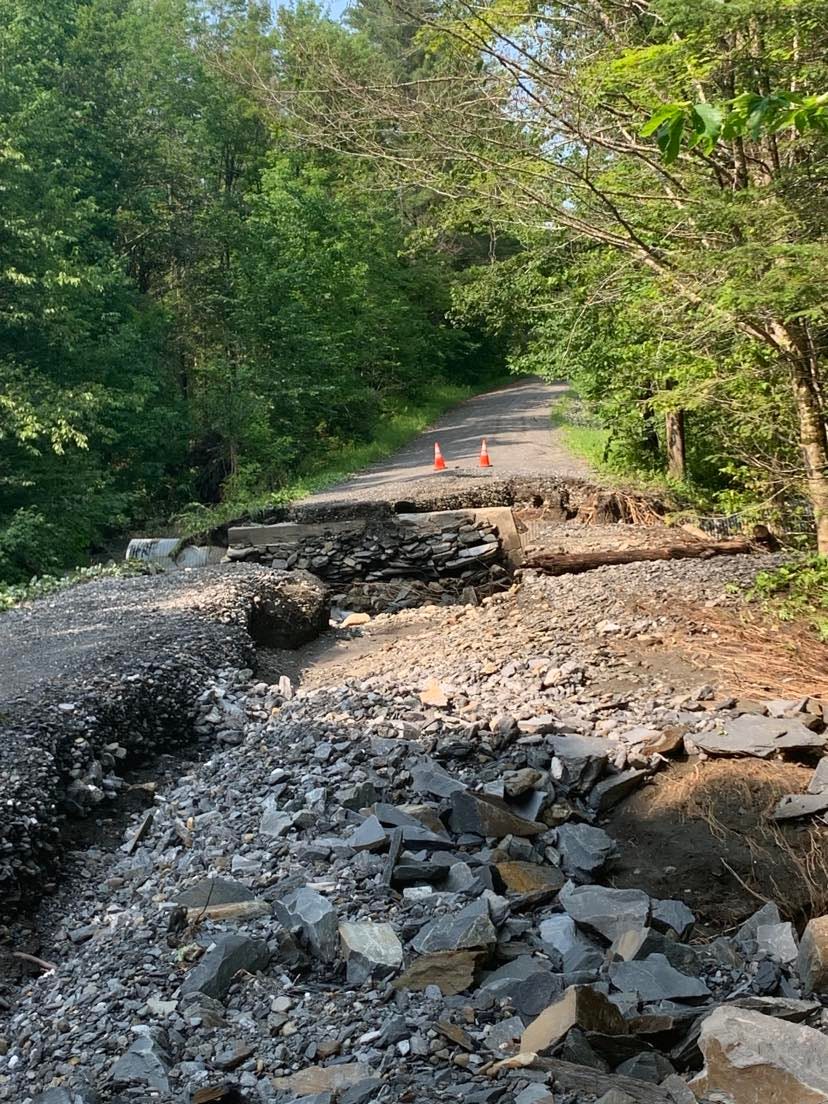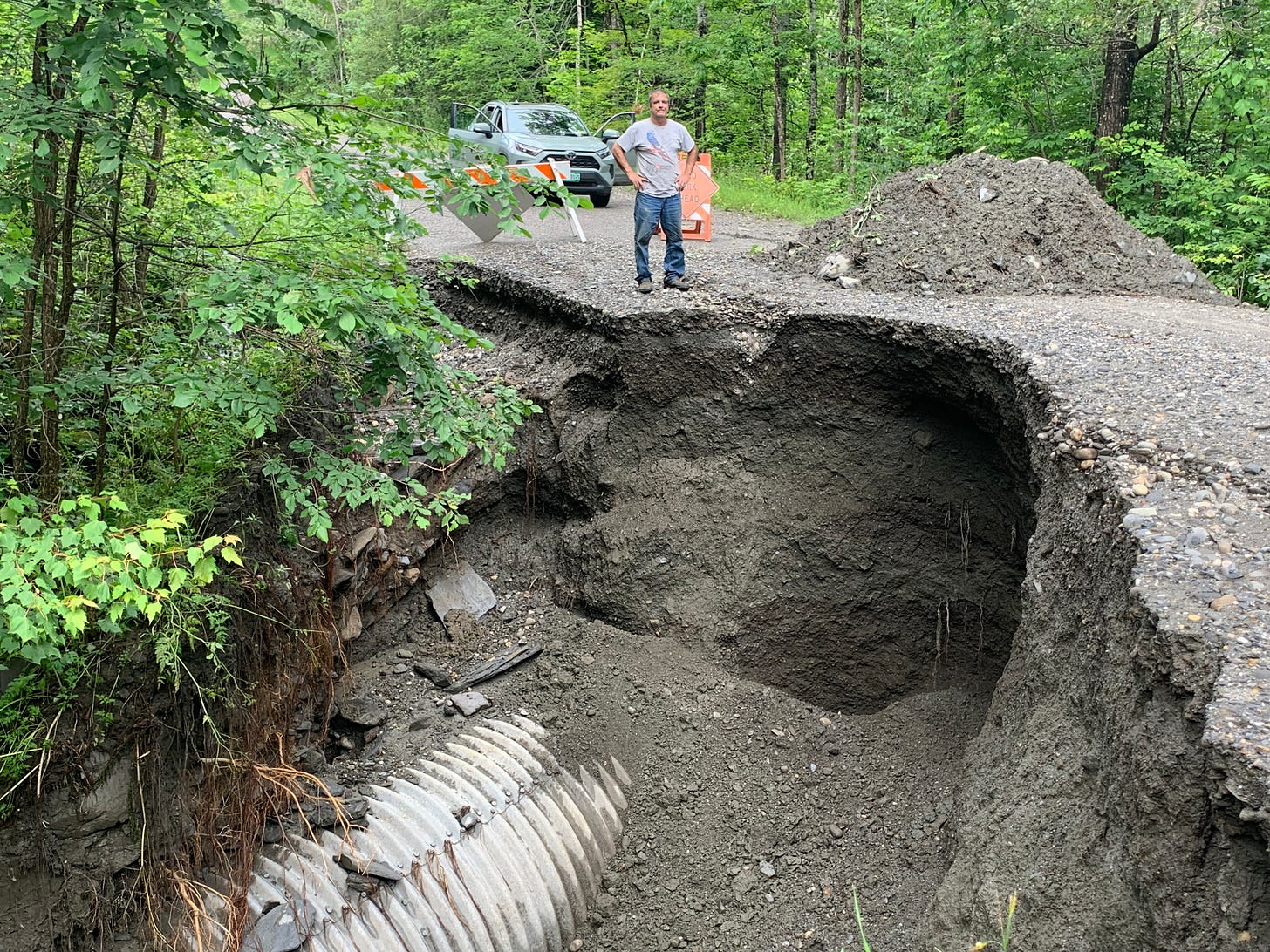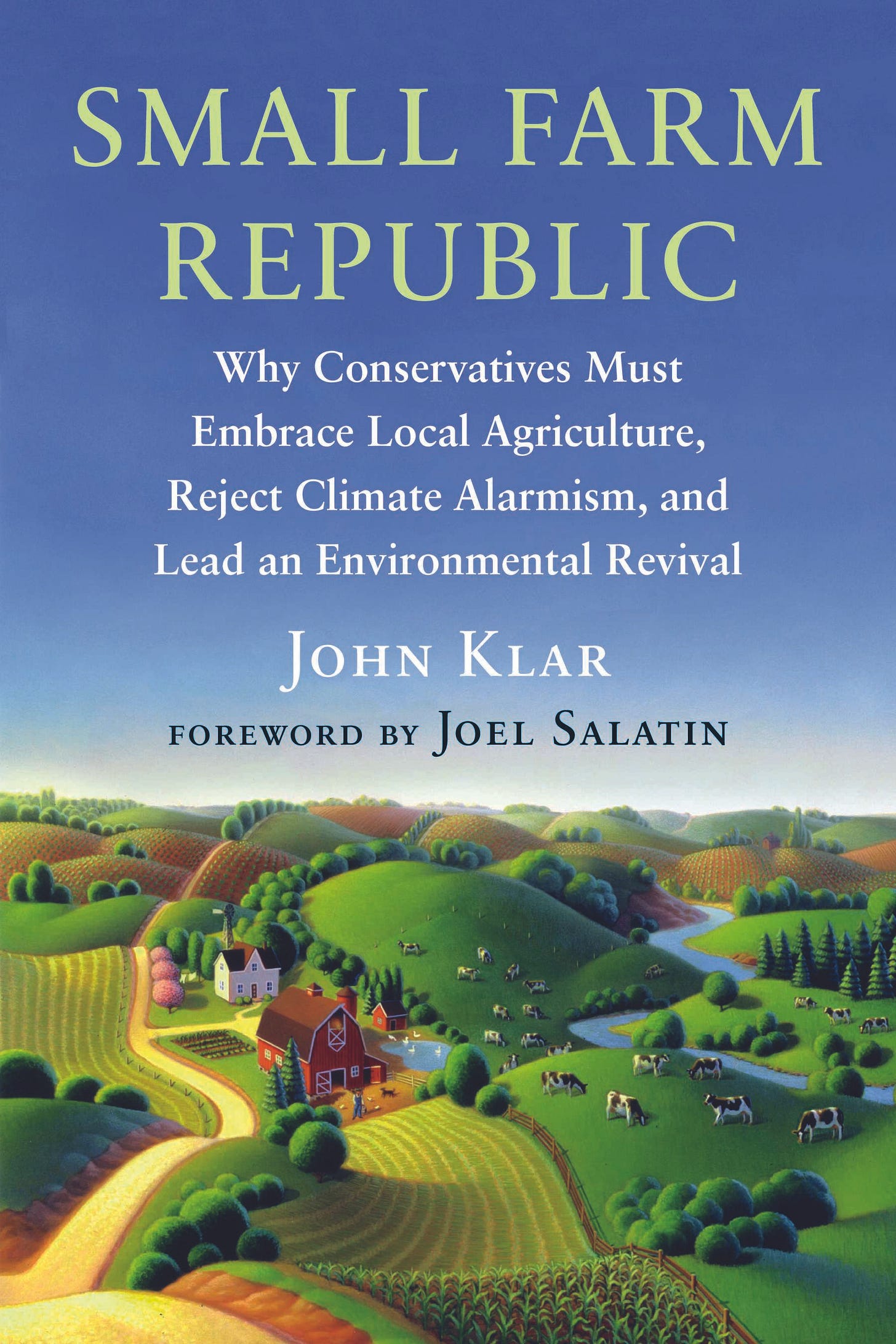Vermonters saw record rainfall in recent weeks, and it hasn’t let up. One report said parts of the state received four times as much rain as Hurricane Irene—in just 48 hours!
My wife Jackie and I live smack dab in the center of the Green Mountain State, at an elevation of roughly 1,800 feet. That safe perch protected us from the floods near rivers that impacted many friends and family, though our basement flooded and we lost power. But we also had four roadways severed below us from washout, making travel to nearly everywhere circuitous and lengthy.
Our roads are all dirt here on the mountain, and our main connection to the pavement is down East Hill Road, an extremely steep descent that collected rainwater en masse, including from sideroads and burst streams. I have been navigating this road since the 1960s: it has improved a great deal since then, but it could not resist the recent rains.
(East Hill Road, East Brookfield, VT)
Cutting off East Hill Road with a ten-foot ravine punctured our direct route to Randolph, requiring a lengthy roundabout route over circuitous and dubious backroads, many laced with their own holes, soft shoulders, and other hidden pitfalls. Two different bridges washed out on Halfway Brook Road (an alternative path to civilization): one of these has been our family swimming hole for many decades, and it is unrecognizable. The other washed out precariously, leaving cars traveling over a thin slice of compacted gravel. A fourth washout on South Hill Road cut off our route to Williamstown: that road is gone for hundreds of feet.
(A precarious crossing on Halfway Brook Road.)
But what I want to share with you, dear reader, is the almost warlike aftermath as the Vermont woodchucks rose early and eagerly to repair the damage and rescue their neighbors. As we drove about on our normal business, I witnessed an eclectic bevy of hardworking blue-collar workers attacking the newly formed ravines, gorges, and mountains of debris like ants, or a hive of worker bees. I saw one old geezer in an excavator whose dangling white beard would put ZZ Top to shame; another young redneck had his arms folded across his chest as he navigated a monstrous digger down East Hill. Others in highlighter-green T-shirts slaved over shovels, or shunted massive truckloads of gravel back and forth from local quarries to various worksites.
That East Hill ravine was completely repaired in a few days, as were a myriad of other closed roads. My cousin Brad’s garage in Williamstown (S & D Auto) was deluged under six feet of vicious water when the nearby stream became a raging torrent: the very next day, there was a small army of beer-drinking, chainsaw-toting hardcore laborers attacking the aftermath with that “git ‘er done” vigor, while The Pub delivered pizzas for all, and the sweat of smiling (unpaid) workers mingled with the receding mud.
I have seen this frenzy of disaster response at play in Vermont many times over the decades, especailly in the remote Northeast Kingdom region, where vast swamps and forests (and brutally cold winters with sometimes enormous amounts of snow) compel residents to form community on a regular basis—indeed always. It is a vestige of the communities of the past, displaced by a modern alienation that has accompanied industrialization and mechanized ease.
We call this being “Vermont Strong.” Notably, the “true” Vermonters understand what this entails, while the transplants (pejoratively labeled “flatlanders”) look on in a sort of stupored wonder. I’m not saying urban people do not know how to come together to respond to emergencies. But urbanites are 1) more likely to wait helplessly for others to act; and 2) less likely to possess the skillsets or equipment to effectively contribute.
(The local swimming hole used to be on the right side of this section of Halfway Brook Road.)
I have witnessed this cultural divide throughout my life, with interest. This division reflects a deeper disparity between dependency and self-reliance: in the city, self-reliance is virtually impossible; in the country, it is imperative. This is a difference in value systems, but not really due to choice as much as circumstance. And as more country people have relocated to the city, more and more of them and their children have abdicated action to others.
Consider the United Kingdom, which (aside from parts of Scotland and Wales) receives comparatively little snowfall. When a mere inch of snow appears, the country is essentially paralyzed: no snow tires, chains, plows or salt-trucks stand waiting to enlist in retaliation against snow—they just wait for it to melt. Whereas New Englanders get out the shovels and leave early for work after a snowstorm, the Brits brew tea and curl up with a blankie. More, they expect to (and do!!) get paid for the time off, whereas in America it is the employee’s obligation to arrive punctually at work—his or her job starts when they get to the job site, and the responsibility is theirs to arrive.
We Yanks may chortle at helpless Limeys stranded by mere whisps of snow, but the situation is little different in Georgia or Florida when unseasonable weather visits. New Jersey lacks anything like the snow-clearing infrastructure of nearby New York, plugging up its roadways in blizzards as police cars with summer tires spin off into the ditch to join the civilian logjam.
Vermont is a different place altogether. There are few opportunities to learn to operate a chainsaw in Manhattan, let alone a winch, excavator, or bulldozer. True, FEMA awarded funds to help Vermont, and the State has announced $30 million in relief funds, but the skillsets needed to truck all that matériel were ready and waiting in the rural backwoods workforce. Vermont is a place where learning how to use tools and fix things is historically integral to the culture. This extends then to welding, or shooting guns for sport or food, trapping and fishing, and even letting children drive tractors, herd or milk cows, or ride on the log truck. It is controlled risk that teaches these skills; they cannot be learned in a sterile classroom.
Vermont has some of the highest electric rates in the nation, due to steep mountains and ubiquitous trees that make maintaining electric service for the sparce residents a constant and expensive battle. Our roads are similarly a constant battlefront against frost heaves, washouts, potholes and collapsed bridges. Our driveways and businesses are routine casualties in our ongoing conflict against the elements. I have many times had to retrieve my chainsaw to clear trees just to get to my doorstep; other times I have driven around with that handy tool to clear trees as I cross the state, just as the busy-beaver Vermonters who joined almost happily together in purpose after these recent storms to keep roadways open. Waiting on the government is folly here: if you want to get something done, do it. Or, call a friend or neighbor who has the tools, knowledge or equipment.
But just as the City Mouse never learned to milk a cow or deliver a lamb, so too the basic mechanical and trade skills required to tackle emergencies are less prevalent in Newark, New Jersey than Newark Vermont; or Albany, New York versus Albany, Vermont. These places share names, but they are worlds apart in culture
.(South Hill Road in Williamstown, Vermont)
Culture reflects a community’s values, and the best computer programmer on the planet has no value in a blackout with gullied roads unless he can hoist a shovel or operate a backhoe. Too often, the white collar class instead eclipses the practical work ethic and common sense knowledge required to actually accomplish the task.
Vermont is cleaning up its muddy mess like Cindy Lou Who and the Whos of Whoville responded to the Grinch’s theft of their Christmas food—it is an essentially joyful community of workers in common purpose, unflapped by the crisis. Many of these workers do this type of work every day, but now attract the recognition of the importance of their grunt skills. Consider the indefatigable flaggers who protect workers and drivers at personal risk, while standing in one place in all weather—like the “rain, sleet, or snow” mailman of old.
Much like a sea passenger on a capsizing freighter who never learned to swim, the city people don’t do much but gawk at the damage, and gape at those doing the labor. That old white-bearded excavator operator is a spectacle for the posh-posh elites who peer from their Mercedes or EV as if they were out on another leaf-peeping jaunt. They are alienated from the cultural activity that surrounds them; like soft-skinned tourists in a motor home at a wildlife park, watching the giraffes and lions from the safety of their air-conditioned vehicle. (I just can’t see Vermont Senator Phil Baruth trading in his pen for a chainsaw: he might break a manicured fingernail).
Can you hear the blue-collar elitism in my tone? But truly, I do not look down at the vulnerable elites who depend on others for their very lives: I have compassion for them. They are quick to fear, and even quicker to seek a bureaucratic path rather than just “get ‘er done.” They are victims of a unique modern ignorance; a disconnect from their inescapable ties to land and community. We all have feet of clay, and are threatened by the ecosystem: but some have feet of granite.
The problem in the United States today, and one which will become more salient as the nation deteriorates, is that we have granite-footed clown technocrats running things to create rather than combat crises. What does the clown AOC, or the charlatan John Kerry, know about cows and cow farts?---where are the farmers who can teach the naked emperors about that pesky draft blowing up their skirts? What does Bill Gates know about beef, or agriculture, that he would try to use the WEF to “rescue” the world from cows and hamburger? What does Joe Biden know about experimental puberty blockers, that he would use the might of the federal government to provide them gratis to pre-pubescent children behind their parents’ backs? Where is the common sense that once had a voice in our nation?
What I saw in the aftermath of Vermont’s record rainfall was a functional community of competent and robust individuals who possessed the skillsets and the motivation (values) to rescue a wilderness community and pull together. This contrasts sharply with the Vermont Legislature, most of whom have decided that they will run things from their deluded citadel rather than allow the dirty masses to have a say. It equally collides with the US Congress, a babbling batch of bureaucratic baboons, creating monetary, social, and economic crises for Americans’ future, and leaving it to those with common sense and a can-do ability to mop up when they are done leading us off their utopian cliffs.
(A perspective of the washout on Halfway Brook Road. Perhaps the waterway should be renamed Halfway Road Brook.)
Which brings us to the real tragedy, not of rain and washed-out roadways but of deterioration of character and knowledge in favor of a washed-out consumerism and empty cultural uniformity. Vermont experienced a much greater storm, in the Great Flood of 1927, when it had less modern equipment but many more people who knew how to serve each other with basic skills. When the nation soon faces a much greater trial than a natural disaster, the rural men and women will separate from the urban boys and girls, like oil from water.
THAT will be a whole new identity politics. Americans must prepare—and prepare their children—for the future calamities that hang darkly above us. In that world, common sense and community will be resurrected, while technocratic ineptitude will sink like toxic lead.
It’s a good time to learn a trade…. Or at least how to cut wood.










It’s amazing how being resilient kicks in after a storm. Glad all are safe.
In Weston my driveway got fixed next day without me asking. Lot of heroic hard work done around here. As a flatlander who went through Irene I just am not sure if I can take seeing water at my door again. I don’t know what to say to people I know who didn’t have much and now have less. Great writing. True description.